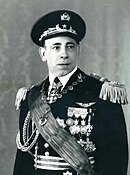This article needs additional citations for verification. (December 2009) |
Presidential elections were held in Portugal on 8 June 1958, during the authoritarian Estado Novo regime led by Prime Minister António de Oliveira Salazar.
| ||||||||||||||||
| Turnout | 77.35% ( | |||||||||||||||
|---|---|---|---|---|---|---|---|---|---|---|---|---|---|---|---|---|
| ||||||||||||||||
 Results by district, councils and overseas provinces | ||||||||||||||||
| ||||||||||||||||
Incumbent President Francisco Craveiro Lopes had clashed with Salazar and did not seek another term, either as candidate of the regime or for the opposition, which deemed the incumbent president capable of winning the race. In Craveiro Lopes' place, the National Union, the sole legal political party, levied naval minister Américo Tomás, a conservative.
The democratic opposition backed Air Force General Humberto Delgado, who ran as an independent in an attempt to challenge the regime. When asked if he would retain Salazar if elected, Delgado famously replied, "Obviously, I'll sack him."[1] Delgado knew that under Portugal's corporatist constitution, the president still had the right to dismiss the prime minister, which was effectively the only check on Salazar's power.
The official tally was 76.4 percent for Tomás and 23.6 percent for Delgado. The regime's secret police force, PIDE, harassed and attacked Delgado voters and supporters, and there were many reports of widespread electoral fraud.[2] For example, Salazar refused to allow opposition representatives to observe the counting of ballots.[1]
Many neutral observers believe that Delgado would have won in a landslide had Salazar allowed an honest election. Nevertheless, the results came as a shock to Salazar. Leaving nothing to chance, in 1959 he had the Constitution amended to transfer the presidential election to the National Assembly, which was a pliant tool of the regime. As a result, the 1958 election would be the only presidential election during the 48 years of the Second Portuguese Republic (in both of its incarnations as the Ditadura Nacional and the Estado Novo) in which an opposition candidate actually stayed in the race until election day. In previous years, whenever the opposition put forward any candidates at all, they were intimidated into withdrawing before the polls opened.
Universal suffrage was not reintroduced until after the Carnation Revolution and the return of democracy in 1974.
Official results edit
| Candidate | Party | Votes | % | |
|---|---|---|---|---|
| Américo Tomás | National Union | 765,081 | 76.42 | |
| Humberto Delgado | Independent | 236,057 | 23.58 | |
| Total | 1,001,138 | 100.00 | ||
| Valid votes | 1,001,138 | 99.97 | ||
| Invalid/blank votes | 340 | 0.03 | ||
| Total votes | 1,001,478 | 100.00 | ||
| Registered voters/turnout | 1,294,779 | 77.35 | ||
| Source: Fórum História, De Almeida, Presidency[3] | ||||
Results by district edit
| District | Tomás | Delgado | |||
|---|---|---|---|---|---|
| Votes | % | Votes | % | ||
| Aveiro | 40,087 | 69.43% | 17,651 | 30.57% | |
| Beja | 14,540 | 86.81% | 2,209 | 13.19% | |
| Braga | 48,813 | 72.19% | 18,809 | 27.81% | |
| Bragança | 19,534 | 75.93% | 6,193 | 24.07% | |
| Castelo Branco | 30,783 | 93.13% | 2,271 | 6.87% | |
| Coimbra | 33,944 | 71.35% | 13,629 | 28.65% | |
| Évora | 13,101 | 77.22% | 3,865 | 22.78% | |
| Faro | 22,179 | 86.69% | 3,405 | 13.31% | |
| Guarda | 29,565 | 83.17% | 5,983 | 16.83% | |
| Leiria | 33,284 | 76.14% | 10,433 | 23.86% | |
| Lisbon | 110,939 | 71.90% | 43,359 | 28.10% | |
| Portalegre | 16,542 | 81.27% | 3,812 | 18.73% | |
| Porto | 69,174 | 66.10% | 35,473 | 33.90% | |
| Santarém | 37,645 | 64.22% | 20,974 | 35.78% | |
| Setúbal | 12,973 | 70.57% | 5,409 | 29.43% | |
| Viana do Castelo | 20,797 | 73.91% | 7,342 | 26.09% | |
| Vila Real | 26,899 | 85.62% | 4,519 | 14.38% | |
| Viseu | 46,692 | 85.19% | 8,117 | 14.81% | |
| Angra do Heroísmo | 11,255 | 99.72% | 32 | 0.28% | |
| Funchal | 16,024 | 85.59% | 2,698 | 14.41% | |
| Ponta Delgada | 13,796 | 95.25% | 688 | 4.75% | |
| Angola | 22,295 | 67.71% | 10,630 | 32.29% | |
| Cape Verde | 13,191 | 97.67% | 314 | 2.33% | |
| Guinea | 1,624 | 79.07% | 430 | 20.93% | |
| Macau | 1,507 | 100.00% | 0 | 0.00% | |
| Mozambique | 13,385 | 61.29% | 8,454 | 38.71% | |
| Portuguese India | 16,773 | 95.64% | 765 | 4.36% | |
| São Tomé and Príncipe | 5,249 | 100.00% | 0 | 0.00% | |
| Timor | 1,853 | 100.00% | 0 | 0.00% | |
| Source: Presidency[4][3] | |||||
References edit
- ^ a b James Badcock (13 February 2015). "Did Portugal's dictator Salazar order killing of rival?". BBC News.
- ^ "Portugal > History and Events > Date Table > Second Republic".
- ^ a b "Eleição do Presidente da República". Museum of the Presidency of the Republic (in Portuguese). Retrieved 12 June 2023.
- ^ "Eleição do Presidente da República". Museum of the Presidency of the Republic (in Portuguese). Retrieved 12 June 2023.

